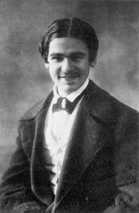Filippo De Pisis
Filippo De Pisis | |
|---|---|
 De Pisis aged 18 | |
| Born | Luigi Filippo Tibertelli 11 May 1896 Ferrara, Kingdom of Italy |
| Died | 2 April 1956 (aged 59) Milan, Italy |
| Resting place | Cimitero monumentale della Certosa di Ferrara, Ferrara |
| Known for |
|


Filippo De Pisis (11 May 1896 – 2 April 1956) was an Italian painter and poet.
Biography
[edit]De Pisis was born Luigi Filippo Tibertelli in Ferrara, Italy. He studied literature and philosophy at the University of Bologna beginning in 1914.[1] In 1919 he moved to Rome, where he started to paint. He published a collection of his writings, La città dalle 100 meraviglie, in 1920.[1] While important editors of his time criticized De Pisis for producing overly-sentimental poetry, this emotional streak translated well on canvas. De Pisis is best known for his cityscapes, metaphysically-inspired maritime scenes, and still lifes, especially those depicting flowers. His work has a particularly airy, in-the-moment quality, and is laden with a sort of pathetic pleasure-pain. There are unexpected juxtapositions of scale and space, as when still-life objects are arranged on a surface that seems to join together with the seascape beyond.[1] De Pisis also executed a large body of lesser-known work, comprising homoerotic sketches of the male nude.
De Pisis spent his life in Rome, Paris and Venice. He lived a very extravagant lifestyle; he had a pet parrot named Coco, and in Venice he was one of a handful of residents at the time who used a gondola. He had two personal gondoliers on 24-hour duty, who wore black-and-gold livery.
De Pisis's work was shown twice in the Venice Biennale: once during his life, and once posthumously.
In his later years he suffered from a neurological disorder. In 1948 he entered a clinic in Bologna, and from 1949 until his death his main residence was Villa Fiorita in Brugherio, a nursing home for patients with nervous diseases.[1] He died in Milan in 1956.
Legacy
[edit]De Pisis's work for the Verzocchi collection in 1949–1950 is now housed in the Pinacoteca Civica of Forlì. A large portion of his work is also housed in the Museo Filippo de Pisis in Ferrara.
One of the three comprehensive schools in Brugherio is named for Filippo de Pisis.[2]
References
[edit]- ^ a b c d Gale, Matthew and Valerio Rivosecchi. "De Pisis, Filippo". Grove Art Online. Oxford Art Online. Oxford University Press.
- ^ Filippo de Pisis School Archived 2015-06-21 at the Wayback Machine, icdepisis.gov.it, Retrieved 9 August 2015
Bibliography
[edit]- Zanotto, S.; Filippo De Pisis ogni giorno, Venice, Italy (1991) (in Italian)
- Naldini, N.; De Pisis - Vita Solitaria di un Poeta Pittore, Turin, Italy (1991) (in Italian)
External links
[edit]- Filippo De Pisis at Find a Grave
- A tribute to Filippo De Pisis with photos and critics
- Museo Cantonale d'Arte, Lugano: Filippo De Pisis


 French
French Deutsch
Deutsch